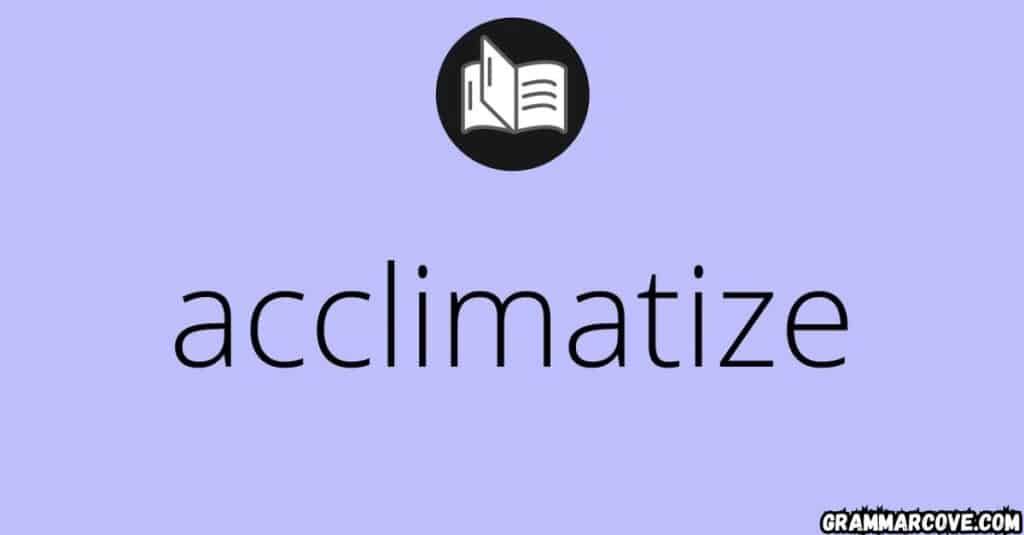When it comes to adjusting to new environments, whether it’s a change in climate, culture, or workplace dynamics, acclimation plays a central role. But do you ever find yourself questioning which verb to use? Should it be acclimate vs acclimatize, or perhaps even acclimatise? Understanding the subtle differences between these terms can help you communicate more effectively, ensuring you choose the right word for any given situation.
Though all three words carry the same essential meaning—adjusting to new conditions—their usage can differ based on regional preferences and context. Let’s dive into these verbs, their subtle differences, and how to choose the right one in various scenarios.
Understanding the Difference Between Acclimate, Acclimatize, and Acclimatise
Before we get into examples, it’s crucial to understand the distinction between these verbs. Acclimate and acclimatize are often used interchangeably, particularly in American English, but there are some nuances that can guide you toward the more appropriate choice. Meanwhile, acclimatise is simply the British English spelling of acclimatize, and it follows the same rules.
Acclimate
“Acclimate” is a verb commonly used in American English to refer to adjusting to a new environment or condition. Whether it’s adjusting to a new job, a different time zone, or an unfamiliar climate, acclimate focuses on the process of becoming accustomed to something new.
Acclimatize/Acclimatise
On the other hand, acclimatize (or acclimatise in British English) is widely used to describe the same process. The difference mainly lies in regional preferences, with acclimatize preferred in American English and acclimatise favored in British English. There’s no difference in meaning between acclimatize and acclimatise, but using the correct spelling for your audience is key.
Acclimation vs Acclimatization
It’s also important to differentiate between acclimation and acclimatization. Both terms refer to the process of adjustment, but they are often used in different contexts. Acclimation is usually associated with a faster, more immediate adjustment, often in relation to physical or environmental changes. Acclimatization, on the other hand, tends to describe a more gradual process, often related to adapting to environmental factors like climate or altitude over a longer period.
Picking the Right Verb: Acclimate vs Acclimatize
Choosing between acclimate vs acclimatize might seem tricky, but it largely depends on where you’re writing or speaking. If you’re based in the United States, acclimate is more commonly used. For those in the UK or other parts of the world that follow British English conventions, acclimatize (or acclimatise) will feel more natural.
Let’s explore some real-world examples of how these verbs come into play.
Example 1: Email to a Team Member About Adjusting to New Job
Subject: Getting Comfortable in Your New Role
Hi Rachel,
I hope your first week has been great so far! I know transitioning into a new role can take some time, but I’m confident you’ll acclimate quickly to the team. As we discussed, we’ll have a few one-on-one meetings to help you acclimate to our company culture and the various tools we use. Please don’t hesitate to reach out if you need any guidance along the way!
Looking forward to working with you.
Best regards,
John
In this scenario, the verb acclimate works because it suggests the process of adjusting to a new work environment, something that typically happens fairly quickly. John encourages Rachel to become comfortable with the culture and tools, indicating a smoother transition.
Example 2: Email About Adjusting to a New Climate
Subject: Tips for Adjusting to the Cold Weather
Dear Mark,
I hope you’re doing well in your new location. I know it’s been a few weeks since you moved to the north, and I just wanted to check in and see how you’re doing with the change in weather. It can take some time to acclimatize to the colder temperatures, but don’t worry, you’ll soon get used to it! Try layering your clothes, and remember that it’s completely normal to feel the chill at first.
Best,
Sophia
In this example, acclimatize fits best because Mark is adjusting to a new climate, which typically takes time and is often gradual. The use of acclimatize suggests that Mark will slowly adapt to the colder weather.
Example 3: Email to a Team Member Moving to a Different Time Zone
Subject: Time Zone Shift
Hi Alex,
As you prepare to travel to our office in Paris, I just wanted to remind you that it might take a few days to acclimatize to the new time zone. Make sure to get plenty of rest during your flight so you can hit the ground running. We’ve scheduled a few lighter meetings to help you ease into the new schedule, and we’re here to support you during the transition.
Safe travels,
Amanda
Here, acclimatize is again the more fitting choice because it refers to Alex adjusting to the time zone change, which may take a bit longer than adapting to a new environment.

Acclimatized vs Acclimated: Which One Should You Use?
The debate over acclimatized vs acclimated mirrors the earlier discussion about acclimate vs acclimatize. Although both terms describe the process of adjustment, acclimatized is more commonly used in scientific and medical contexts, particularly when referring to physiological changes (e.g., adjusting to high altitudes). Acclimated, on the other hand, is often used in more casual settings, especially in American English.
Example 4: Email About a New Office Environment
Subject: Your New Workspace
Hey Thomas,
I hope you’re finding your new office space comfortable! It usually takes a few days to acclimate to the new layout, but I’m sure you’ll get used to it quickly. The team’s really looking forward to collaborating with you more closely once you’ve had some time to settle in.
Best,
Rachel
In this scenario, acclimate is the natural choice since the adjustment is more about getting comfortable with the physical workspace and team dynamics. Acclimated is also a good option, but acclimate flows more smoothly in this context.
When Should You Use Acclimatise?
As mentioned, acclimatise is the British English variant of acclimatize, so its usage largely depends on your audience. If you’re writing to a reader or audience in the UK, Australia, or other countries that use British spelling conventions, acclimatise is your go-to choice.
Example 5: Email to a Client in the UK
Subject: Preparing for Your Upcoming Event
Dear Olivia,
I hope you’re doing well! I know the team is excited about your upcoming event in London. As we discussed, it will likely take some time to acclimatise to the new environment. If you need any assistance with getting used to the city’s pace or logistics, feel free to let us know.
All the best,
James
Here, acclimatise is used because the audience is based in the UK, where British English is the standard.
A Quick Comparison Table
| Verb | Usage | Context | Example |
|---|---|---|---|
| Acclimate | American English; adjust to a new environment | Quick adjustments in workplace, social settings | “It’ll take a few days to acclimate to the team.” |
| Acclimatize | American and British English; adjust to environmental conditions | Gradual changes like climate or altitude | “It may take weeks to acclimatize to the high altitude.” |
| Acclimatise | British English; same meaning as acclimatize | Used in the UK and other regions | “We’ll acclimatise to the cooler weather over time.” |
Conclusion
While acclimate and acclimatize are largely interchangeable, it’s essential to recognize regional preferences and subtle differences in usage. Understanding when to use acclimatize or acclimate comes down to context and audience. For those in the UK or using British English, acclimatise is the preferred spelling, but it carries the same meaning as acclimatize. By considering these factors, you’ll be well on your way to mastering these verbs and making your writing clearer and more engaging.
Remember, whether you’re adjusting to a new job, a new climate, or a different time zone, the key is finding the right word for the right situation. So, next time you’re writing about someone’s adjustment process, choose the verb that feels most natural for your audience.


